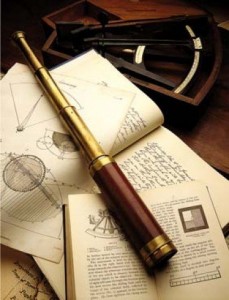
I’m taking a run at the Lexicon and Microscope idea I’ve been working on. Here is the first cut of the guidelines.
These guidelines are derived from Lexicon (created by Neel Krishnaswami) and Microscope (created by Ben Robbins).
While both Lexicon and Microscope are presented as games, we are treating this more as a ‘shared activity’ — in part because it is difficult to come up with a good scoring mechanism, but mostly because nobody cares about winning.
Activity in Seekers of Lore takes part in three stages, with different roles and activities involved.
Framing Stage
In the framing stage the participants outline the structure of the setting. Participants have the opportunity to identify elements that are either to be included (or at least cannot be excluded; nobody is required to write about these items if they are not interested, but nobody is allowed to write them out) or excluded (regardless of what anyone in the setting says, these things do not exist). It is not necessary to be exhaustive, this is mostly to give the opportunity to identify non-obvious expectations.
This is followed by the academic and exploration stages. The academic and exploration stages are more or less concurrent, but are described separately here because they consist of different activities.
Academic Stage
In the academic stage, the participants take the roles of Scholars, learned (and opinionated) individuals who try to make sense of what their world has become. They write posts in this wiki describing elements of the setting — people, places, things, ideas, and so on. Scholars follow these guidelines:
- each article references at least two other articles in the wiki
- in the first round, both new articles will not exist;
- in the second and following rounds, one must be entirely new (must not have been written and must not already be referred to) and at least one must already exist;
- additional references may be made freely to articles that have already been written, or not written but already referred to;
- a Scholar may not satisfy a reference made in an article written by that Scholar;
- a Scholar may not refer in one article to another article written by that Scholar;
- no article can directly contradict another, but contradictory evidence may be discovered
- strict academic neutrality and passive language are not required; Scholars are encouraged to write in their own voices
- each article is to identify one or more questions or ambiguities, things that are not critical to the structure of the setting but are not yet known
- the questions and ambiguities are fodder for quests and adventures in the exploration stage, below
- procedurally, questions and ambiguities are best included in the text of the article, but should also be called out explicitly in a bullet list at the bottom of the article; when resolved the article text referring to them can spawn a reference to an article (doesn’t count against the article reference count, and may be written by the Scholar who wrote the article)
- each question or ambiguity is not phrased as a question, but as a name (of an event, place, or thing); a question is not “how did the last king of Antallis die?” but “The Death of the Last King of Antillis” (this is partly a style thing, and partly because I think ‘asking a question’ makes assumptions about the situation that naming the question does not… and it sounds cooler)
I see no need to try to write about things ‘by letter’. I think that was a procedural matter more than anything inLexicon, and since this is not running a prescribed number of turns I think a more natural distribution might work better.
The number of references was chosen specifically because it keeps the total number of unresolved articles to a manageable level (two per Scholar). On a Scholar’s first turn a new article is created that is not required to reference an existing article but must reference two articles that have not been written or reference. Each turn after that the Scholar will write one article that has been referenced but not previously written (removing one of the unresolved references) and add another unresolved reference. When a Scholar leaves, it would be good form to write one last article that references two existing articles and adds no unresolved references.
The Exploration Stage
This stage is played out entirely away from this wiki. A gaming group aims to answer a question or resolve an ambiguity. A GM can plan an adventure (based on material in the wiki, among other things) to resolve the question, and when the question is answered the wiki will get updated with the information.
I think this would be best done using the adventure log. If a group aims to solve a question, log it (“The Company of Ravens is headed to the Ghost Hills to discover the secrets of the Heart of Darkness”) so others don’t try to answer the same question… or at least, not until the Company of Ravens is TPKed or returns in terror and it is clear they aren’t going to solve it. When an answer is found, proclaim it loudly in the adventure log and update the wiki.
I look forward to helping with this.